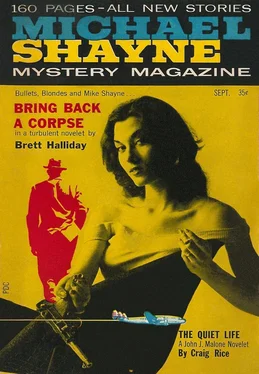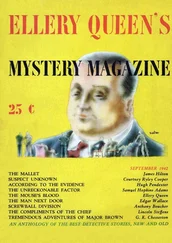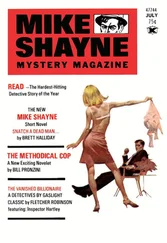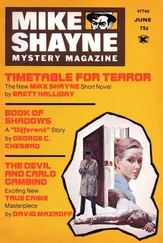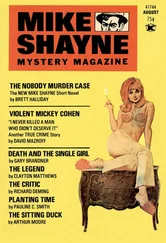Robert Bloch - Michael Shayne Mystery Magazine. Vol. 1, No. 1. September 1956
Здесь есть возможность читать онлайн «Robert Bloch - Michael Shayne Mystery Magazine. Vol. 1, No. 1. September 1956» весь текст электронной книги совершенно бесплатно (целиком полную версию без сокращений). В некоторых случаях можно слушать аудио, скачать через торрент в формате fb2 и присутствует краткое содержание. Город: New York, Год выпуска: 1956, Издательство: Renown Publications, Жанр: Детектив, на английском языке. Описание произведения, (предисловие) а так же отзывы посетителей доступны на портале библиотеки ЛибКат.
- Название:Michael Shayne Mystery Magazine. Vol. 1, No. 1. September 1956
- Автор:
- Издательство:Renown Publications
- Жанр:
- Год:1956
- Город:New York
- ISBN:нет данных
- Рейтинг книги:3 / 5. Голосов: 1
-
Избранное:Добавить в избранное
- Отзывы:
-
Ваша оценка:
- 60
- 1
- 2
- 3
- 4
- 5
Michael Shayne Mystery Magazine. Vol. 1, No. 1. September 1956: краткое содержание, описание и аннотация
Предлагаем к чтению аннотацию, описание, краткое содержание или предисловие (зависит от того, что написал сам автор книги «Michael Shayne Mystery Magazine. Vol. 1, No. 1. September 1956»). Если вы не нашли необходимую информацию о книге — напишите в комментариях, мы постараемся отыскать её.
Michael Shayne Mystery Magazine. Vol. 1, No. 1. September 1956 — читать онлайн бесплатно полную книгу (весь текст) целиком
Ниже представлен текст книги, разбитый по страницам. Система сохранения места последней прочитанной страницы, позволяет с удобством читать онлайн бесплатно книгу «Michael Shayne Mystery Magazine. Vol. 1, No. 1. September 1956», без необходимости каждый раз заново искать на чём Вы остановились. Поставьте закладку, и сможете в любой момент перейти на страницу, на которой закончили чтение.
Интервал:
Закладка:
“If you mean Lyle MacComber, he’s moved to Las Vegas.”
“Las Vegas?” The words came explosively.
“I think he said Las Vegas. Might have been Reno, though. Anyhow, Nevada. Landed a big job up there. Been gone for more’n a year now.”
For a moment, Gladden had the insane urge to laugh. So this was the end of it! All his plans were dissolved into nothing. The long hitch-hike had been useless. Mac wasn’t in Hollywood.
Suddenly, the total fatigue of all the miles that stretched between Hollywood and San Francisco blanketed upon Gladden. He felt as if something inside him had collapsed and with it, his strength. He discovered that his hands were clutching the edge of the desk, that the old man was looking at him curiously.
“Say, you’re all right, ain’t you? Not sick or something?” he asked with concern.
Gladden pushed his hat back from his forehead and let himself lean against the desk. What difference now what the old man thought about him? What reason to be cautious? He didn’t reply until the old man repeated, “You all right?”
“Yeah, yeah. I’m tired, that’s all. I hitch-hiked four hundred miles today to find a guy.”
“MacComber? You know, I sorta figured you was pretty disappointed. When I told you MacComber wasn’t around, you turned white as a sheet. What’d he do — owe you money?”
Gladden let the question go unanswered. In a moment the old man went on with, “Say, if you’re busted — look, I just work here, and I’d catch hell if the manager ever found out — but a couple fellas checked out of Bungalow D about twenty minutes ago, and it won’t be made up till the night gal comes on at eight o’clock. If you wanta lay down in there and rest for a spell, go ahead. There’s a shower, too.”
The word made a picture in Gladden’s mind. A cold, brisk shower, pelting against his body, washing away the heat and the weariness. He said, “Thanks, Pop. That would be swell. Thanks a lot!”
“That’s okay. Maybe someday somebody’ll do a favor for me. You look real done up.”
He walked Gladden to the diminutive porch and pointed out the bungalow. “That’s D — the one with the door open. Don’t worry if you drop off to sleep. I’ll be around a little before eight o’clock and wake you up.”
Bungalow D consisted of a single room and bath. The twin beds were unmade, the pillows rumpled, the bedding tossed back and dragging on the floor. There were two chairs, a bureau, a small table marked with cigarette burns, rings left by damp tumblers. Gladden went into the bathroom, closing the door behind him. He removed his coat, tie and shirt, closed the lid of the john, and sat on it to take off his shoes.
The effort seemed more than he could manage, and he had to pause and rest. He had never imagined he could be so tired. From outside, drifted the sound of a car, the soft throb of a motor, rhythmic, drowsy, blending into a reverie in which he saw a long stretch of pavement, flooded with sunshine and extending on and on between brown, heat-scented hills. Then both sound and image faded.
He was awakened sharply by the opening and closing of the outside door, the slam followed by voices, male voices engaged in a desultory argument.
“It’s gotta be in here.”
“Why didn’t you think about it before we checked out?”
The two men, apparently, were the former occupants of the bungalow. Gladden sat very still, wondering, half fearfully, what he’d say if they should discover him and what would happen to the old man.
The voices went on. “A lousy cigarette lighter.”
“It cost me forty bucks. And it’s got my name engraved on it. Supposin’ somebody finds it and hooks me up with MacComber?”
“How’s anybody gonna hook you up with MacComber? Who knows we come here to get him?”
“That old guy in the office knows. You asked him about MacComber, didn’t you?”
“I didn’t ask nobody about nothin’. I found out MacComber ain’t here, and I found out where he is. Or anyhow, where he’ll be tonight at nine o’clock. Now stop yattin’, and look for your lighter.”
The sound of a dresser drawer being pulled out, then, “All the way to California to rub out a guy. We coulda rubbed him out in Nevada.”
“Don’t be a schmo. You know the setup in Nevada — no killings since Buggsy. If the jerk had only stayed there, he coulda laughed about not payin’ his gamblin’ debts, but now — cripes! Look! There’s your lighter, on the floor by the bed.”
Silence. After that, the opening and closing of the outside door, then the fluttering explosions of a car starting.
Blood pounded beneath Gladden’s temples as the meaning of what he had heard seeped through him. Mac had come back to Hollywood. He was back, and these two men had been sent to rub him out.
Gladden’s initial reactions were instinctive. He began dressing rapidly, filled with a wild, unreasoned urge to do something. What? Perhaps issue a warning — tell the old man in the office — do something.
He was fully dressed, standing outside the bathroom, before he realized he was thinking crazy. The old man would call the police. There’d be questions — questions only Gladden could answer — first, about the two men, then about himself. Who he was, where he was from, what he was doing here. They’d check his replies, find out he was violating his parole by leaving San Francisco. He’d be sent back to prison.
The two men were taking care of Mac. That wasn’t the way Gladden wanted it, but that’s the way it was. That’s the way it had to be now, with him keeping strictly clear of it. He opened the door and looked out. The old man had his radio up to full volume again. The concrete area was deserted. Gladden moved across it to the sidewalk. As he reached it, he heard — or thought he heard — the old man call out to him. He did not look back — just quickened his pace and walked on.
He began to get panicky and his mind shouted conflicting orders. Running away like this was an even worse mistake. When the old man read in the papers about the MacComber killing, he’d remember Gladden, he’d remember this incident. He’d notify the police.
“Young fella — tall — dark hair. He was here last evening around seven o’clock, looking for MacComber. Acted sorta nervous and peculiar. No, he didn’t give me his name or say where he was from. Hey, wait a second! He did say he’d come four hundred miles to find MacComber. So wherever he’s from, it’s four hundred miles from here.”
Then the teletypes would start clicking, and the bulletins would go out. Eventually, they’d pick him up for questioning. Name, Johnny Gladden. Criminal record, assault and robbery. Violating parole. Identified as the man looking for MacComber at the latter’s former residence, only a few hours before nine o’clock, the night of the murder.
He was walking rapidly, his thoughts churning. Take it easy. Slow down. Try to concentrate. Try to think this thing out. The two men — if, somehow, they could be stopped. He could phone the police from a pay station — give a fake name, tell them about the two men. Tell them what? A fantastic story involving two guys you hadn’t seen, couldn’t describe.
The police would think him a crackpot. Even if they believed him, they’d want to know where he overheard these men. When he answered that question, there’d be a squad car on its way to the motel, cops all over the place, listening to the old man’s story.
All right, then, what about an alibi. He could arrange to be someplace where people would see him. He could stay there until after nine o’clock. Better yet, he could be on the next bus headed for San Francisco. He could prove, then, that he wasn’t anywhere near MacComber. Oh, great! At the same time, he’d be proving parole violation and would soon be on the return trip to prison.
Читать дальшеИнтервал:
Закладка:
Похожие книги на «Michael Shayne Mystery Magazine. Vol. 1, No. 1. September 1956»
Представляем Вашему вниманию похожие книги на «Michael Shayne Mystery Magazine. Vol. 1, No. 1. September 1956» списком для выбора. Мы отобрали схожую по названию и смыслу литературу в надежде предоставить читателям больше вариантов отыскать новые, интересные, ещё непрочитанные произведения.
Обсуждение, отзывы о книге «Michael Shayne Mystery Magazine. Vol. 1, No. 1. September 1956» и просто собственные мнения читателей. Оставьте ваши комментарии, напишите, что Вы думаете о произведении, его смысле или главных героях. Укажите что конкретно понравилось, а что нет, и почему Вы так считаете.
